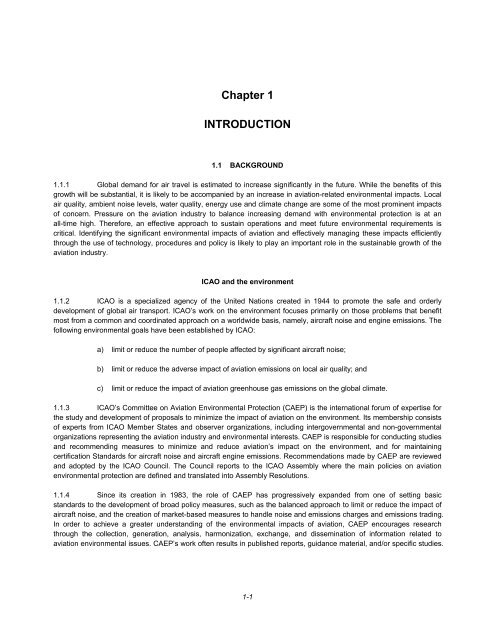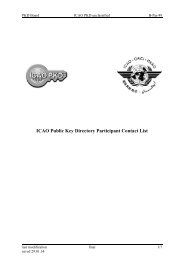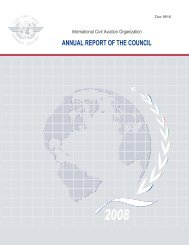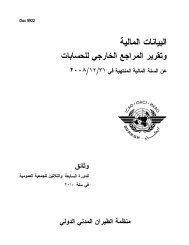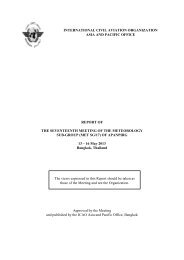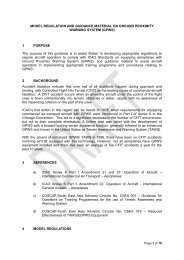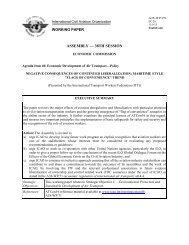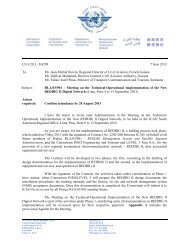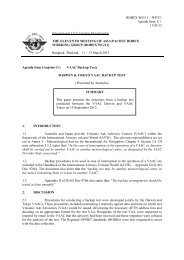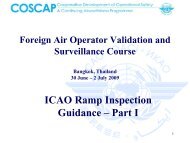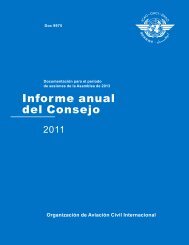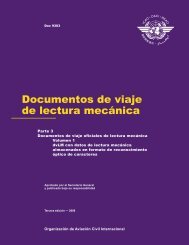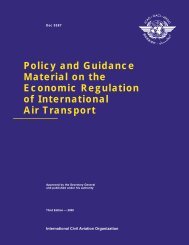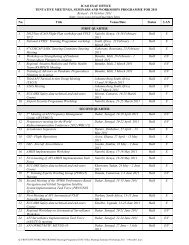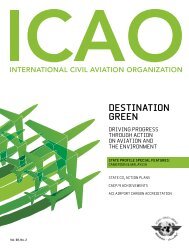Report on Environmental Management System (EMS ... - ICAO
Report on Environmental Management System (EMS ... - ICAO
Report on Environmental Management System (EMS ... - ICAO
You also want an ePaper? Increase the reach of your titles
YUMPU automatically turns print PDFs into web optimized ePapers that Google loves.
Chapter 1<br />
INTRODUCTION<br />
1.1 BACKGROUND<br />
1.1.1 Global demand for air travel is estimated to increase significantly in the future. While the benefits of this<br />
growth will be substantial, it is likely to be accompanied by an increase in aviati<strong>on</strong>-related envir<strong>on</strong>mental impacts. Local<br />
air quality, ambient noise levels, water quality, energy use and climate change are some of the most prominent impacts<br />
of c<strong>on</strong>cern. Pressure <strong>on</strong> the aviati<strong>on</strong> industry to balance increasing demand with envir<strong>on</strong>mental protecti<strong>on</strong> is at an<br />
all-time high. Therefore, an effective approach to sustain operati<strong>on</strong>s and meet future envir<strong>on</strong>mental requirements is<br />
critical. Identifying the significant envir<strong>on</strong>mental impacts of aviati<strong>on</strong> and effectively managing these impacts efficiently<br />
through the use of technology, procedures and policy is likely to play an important role in the sustainable growth of the<br />
aviati<strong>on</strong> industry.<br />
<strong>ICAO</strong> and the envir<strong>on</strong>ment<br />
1.1.2 <strong>ICAO</strong> is a specialized agency of the United Nati<strong>on</strong>s created in 1944 to promote the safe and orderly<br />
development of global air transport. <strong>ICAO</strong>’s work <strong>on</strong> the envir<strong>on</strong>ment focuses primarily <strong>on</strong> those problems that benefit<br />
most from a comm<strong>on</strong> and coordinated approach <strong>on</strong> a worldwide basis, namely, aircraft noise and engine emissi<strong>on</strong>s. The<br />
following envir<strong>on</strong>mental goals have been established by <strong>ICAO</strong>:<br />
a) limit or reduce the number of people affected by significant aircraft noise;<br />
b) limit or reduce the adverse impact of aviati<strong>on</strong> emissi<strong>on</strong>s <strong>on</strong> local air quality; and<br />
c) limit or reduce the impact of aviati<strong>on</strong> greenhouse gas emissi<strong>on</strong>s <strong>on</strong> the global climate.<br />
1.1.3 <strong>ICAO</strong>’s Committee <strong>on</strong> Aviati<strong>on</strong> Envir<strong>on</strong>mental Protecti<strong>on</strong> (CAEP) is the internati<strong>on</strong>al forum of expertise for<br />
the study and development of proposals to minimize the impact of aviati<strong>on</strong> <strong>on</strong> the envir<strong>on</strong>ment. Its membership c<strong>on</strong>sists<br />
of experts from <strong>ICAO</strong> Member States and observer organizati<strong>on</strong>s, including intergovernmental and n<strong>on</strong>-governmental<br />
organizati<strong>on</strong>s representing the aviati<strong>on</strong> industry and envir<strong>on</strong>mental interests. CAEP is resp<strong>on</strong>sible for c<strong>on</strong>ducting studies<br />
and recommending measures to minimize and reduce aviati<strong>on</strong>’s impact <strong>on</strong> the envir<strong>on</strong>ment, and for maintaining<br />
certificati<strong>on</strong> Standards for aircraft noise and aircraft engine emissi<strong>on</strong>s. Recommendati<strong>on</strong>s made by CAEP are reviewed<br />
and adopted by the <strong>ICAO</strong> Council. The Council reports to the <strong>ICAO</strong> Assembly where the main policies <strong>on</strong> aviati<strong>on</strong><br />
envir<strong>on</strong>mental protecti<strong>on</strong> are defined and translated into Assembly Resoluti<strong>on</strong>s.<br />
1.1.4 Since its creati<strong>on</strong> in 1983, the role of CAEP has progressively expanded from <strong>on</strong>e of setting basic<br />
standards to the development of broad policy measures, such as the balanced approach to limit or reduce the impact of<br />
aircraft noise, and the creati<strong>on</strong> of market-based measures to handle noise and emissi<strong>on</strong>s charges and emissi<strong>on</strong>s trading.<br />
In order to achieve a greater understanding of the envir<strong>on</strong>mental impacts of aviati<strong>on</strong>, CAEP encourages research<br />
through the collecti<strong>on</strong>, generati<strong>on</strong>, analysis, harm<strong>on</strong>izati<strong>on</strong>, exchange, and disseminati<strong>on</strong> of informati<strong>on</strong> related to<br />
aviati<strong>on</strong> envir<strong>on</strong>mental issues. CAEP’s work often results in published reports, guidance material, and/or specific studies.<br />
1-1


